Politics
Starmer is stuck in a British bubble, but it will soon be burst by a turbulent world | Rafael Behr
There is plenty of action in British politics but not a lot of movement. The government’s unsteady start in office and a Tory leadership contest have kept the Westminster news machine spinning on the only setting it has: frantic lather. Labour’s poll ratings have tanked but that reflects bleak continuity more than change. Voters who were unhappy before the election are no happier. Old blame is unfairly carried over to the new regime.
The story of whether the government can lift that mood only really begins with the budget on 30 October. In the absence of a settled tax and spending programme, Keir Starmer’s talk of missions and tough choices is all preamble. But that isn’t the only reason politics is in a state of suspended animation. A week after the budget comes the US presidential election. If Donald Trump wins, no one will still be talking about Rachel Reeves tweaking her borrowing rules.
Although I can envisage such an outcome, I doubt I am alone in finding it hard to keep the image in mind without recoiling. The implications are too appalling. Trump despises the principles on which the American republic was founded. His candidacy is an explicit promise to make vindictive, militant and racist ultranationalism the operating doctrine of the world’s most powerful country.
He is a much better friend to Vladimir Putin than to any fairly elected leader of any free country. The character of the threat is documented by Trump’s wild caprices in his first term, then proved beyond doubt by his refusal to accept the legitimacy of his defeat. Still about half of US voters disbelieve that evidence or are prepared to disregard it. The insurrection of 6 January 2021 was a near-death experience for US democracy. This time it could die by suicide.
Even if Kamala Harris wins, there will be no settling back down to an old equilibrium. The sigh of relief will be short. There will still be a schism running through what used to be definable as a singular “west” and is now contested between two irreconcilable tribes: liberal constitutionalists and nationalist crusaders. The former defend a 20th-century legacy of multilateral treaties, respect for democratic protocol and the rule of law. The latter style themselves as warriors in an existential, civilisational struggle against moral decay through “wokeism” and cultural dissolution in an immigrant horde.
With a ballot offering a choice between Kemi Badenoch and Robert Jenrick, the Tories have already elected to oppose Starmer from the nationalist crusader camp. But does the prime minister understand that this is the fight he faces, that he is defending a front that stretches across the Channel and the Atlantic?
Up to a point. The promised “reset” of relations with the EU is off to a cagey start. Britain’s offer of a new security treaty has been accepted in principle but the substance is a long way off. While the vandalistic Brexit mode of diplomacy is long gone, red lines prohibiting a return to the single market limit talk of economic cooperation to the shallow end of the negotiating pool.
Starmer’s reluctance to make any political splash around Europe is understandable, but his continental partners find the inscrutability frustratingly familiar from previous regimes.
When there are so many competing pressures on a government, a preference not to debate hard subjects in public easily becomes a decision not to think about them in private either. Labour looks stuck at the vague, aspirational stage of European policy.
That is consistent with a certain insularity in Starmer’s vision of Britain’s future. He doesn’t ignore global turbulence, wars on Europe’s periphery or the threat from authoritarian regimes and surging populism. He weaves them into his analysis, while keeping them somehow remote, as devices to illuminate the UK as a lone beacon of political stability.
By accepting so many premises of Boris Johnson’s Brexit settlement, Labour has ended up saddled with a weird hybrid, left-leaning, statist version of the Eurosceptic Singapore-on-Thames model. Britain will be a dynamic, free-trading, red-tape-slashing sovereign hub that is also big on social protections and aligned with European rules for some industries.
Earlier this week, at an investment “summit” in London, the prime minister elaborated his economic argument in a speech that was subtly revealing without making headlines. He promised a Labour government of predictable sobriety, in contrast to the vandalistic, spasmodic rule of the Tories. Britain, he said, will go back to being the “stable, trusted, rule-abiding partner” it was once reputed to be, and so a worthy location for investment.
That makes sense as a pitch to a roomful of corporate executives. It also aligns with everything Reeves says about the essential pursuit of economic growth as a precondition for repairing the public realm, and the need for private sector capital to deliver it.
In Starmer’s telling there is then a political dividend. Growth satisfies an appetite for rising living standards and decent services. It proves that moderate, democratic politics works, thereby healing social division and neutralising populism. “Growth leads to a country that is better equipped to come together,” the prime minister said on Monday. “[Growth is] the key ingredient of that ‘great moderation’ we became accustomed to before the financial crash but which together, in partnership, we now have to earn again.”
In summoning the spirit of the long boom before the epic bust of 2007-8, Starmer flashed the nostalgic streak common to many members of his liberal constitutionalist tribe. Trauma at the seismic disturbances of Brexit and Trump inevitably contains longing for political certainties that fell into the hole when the old centre ground collapsed. But it is rare for a political leader to pine for the bygone consensus so explicitly.
The prime minister does know that times have changed. He makes a case for intervention in markets, industrial strategy and enhanced workers’ rights that was highly unfashionable at the turn of the millennium. But there is still something drily economistic about it all. By providing the foundations for long-term investment, a more secure workforce with higher wages and lower NHS waiting lists will be less angry, and less amenable to recruitment by extremists.
It isn’t a bad theory. As a fellow liberal constitutionalist, I want it to be true. But I worry it isn’t enough.
The US experience contains a salutary lesson in the limits of economic growth, which has been robust throughout the Biden years without inoculating the population against fascistic politics. Partly that is a problem of distribution and inflation. Plenty of Trump voters don’t feel higher GDP in their pocketbooks. But many are so captured by paranoia and hyper-partisanship that they refuse to believe in a healthy economy as long as there is a Democrat in the White House.
Britain is not so polarised. Yet. But looking ahead, there is a potential propaganda chorus of Tories, Reform UK and the anti-Labour press denouncing any incremental improvements delivered by Starmer as inadequate or nonexistent. There will be a symmetrical critique from the radical left. And that is if the growth comes. Reeves’s diligent cultivation of Britain as fertile terrain for investment cannot insulate the country from harvest-wrecking storms that blow in from overseas.
This doesn’t have to be a counsel of despair. Starmer has a theory for how Britain might buck sinister anti-democratic trends. He is on the right side of the most important argument of our era. He also has a plan. But it is incomplete and he is intoning it in conference halls to receptive audiences. What he lacks, and badly needs, is an emotional connection with the much tougher crowd that doesn’t believe his kind of politics can ever work.
Politics
Labour volunteers in US helping Harris ‘in spare time’
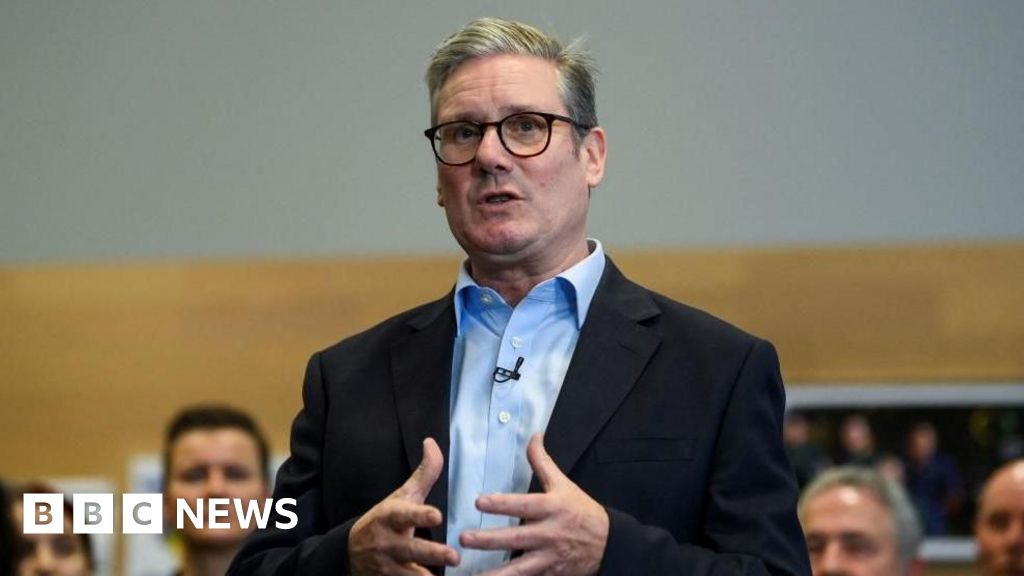
Prime Minister Sir Keir Starmer has sought to play down the significance of alleged interference by the Labour Party in the American presidential election.
The Trump Campaign has filed a complaint with the Federal Election Commission in Washington seeking an immediate investigation – after the Head of Operations for the Labour Party, Sofia Patel, posted on social media that she had “ten spots available” for anyone willing to travel to North Carolina to campaign for Kamala Harris, adding “we will sort your housing”.
She said she had around 100 current and former party staff heading to America before polling day.
The post, on LinkedIn, has since been deleted.
Foreign nationals are permitted to serve as volunteers on campaigns in the US as long as they are not compensated, according to Federal Election Commission rules.
The complaint from the Trump Campaign is both pointed and theatrical.
“When representatives of the British government previously sought to go door-to-door in America, it did not end well for them,” it read.
That is a matter-of-fact reference to US independence around 250 years ago.
On matters more contemporary it requests “an immediate investigation” into what it calls “blatant foreign interference”.
Speaking to reporters while flying to the Commonwealth Heads of Government Summit in Samoa in the south Pacific, the prime minister said: “The Labour Party has volunteers, [they] have gone over pretty much every election.
“They’re doing it in their spare time. They’re doing it as volunteers. They’re staying I think with other volunteers over there.”
The Trump Campaign letter to the Federal Election Commission also says: “Morgan McSweeney, the Prime Minister’s chief of staff, and Matthew Doyle, director of communications, attended the (Democratic) convention in Chicago and met with Ms Harris’ campaign team.
“Deborah Mattinson, Sir Keir’s director of strategy, also went to Washington in September to brief Ms Harris’ presidential campaign on Labour’s election-winning approach.”
Ms Mattinson no longer works for the Labour Party.
Party sources say Mr Doyle and Mr McSweeney went to the Democratic Convention in their own time, and that the Democratic Party didn’t pay their travel and accommodation costs.
It isn’t clear who did.
Asked if the row risked jeopardising his relationship with Donald Trump, the prime minister said “no” – pointing to the dinner the two men had together at Trump Tower in New York last month.
“We established a good relationship. We’re grateful for him for making the time… for that dinner,” Sir Keir said.
“We had a good, constructive discussion and, of course as prime minister of the United Kingdom I will work with whoever the American people return as their President in their elections, which are very close now.”
Sir Keir has never met the Vice-President Harris, Trump’s Democratic rival.
But he has met President Biden several times since becoming prime minister in July.
Politics
Reeves confirms Budget spending deals struck with all departments

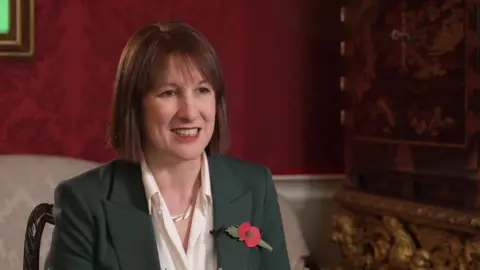 BBC
BBCChancellor Rachel Reeves says she has now reached spending settlements with all government departments ahead of her much-anticipated Budget on 30 October.
It comes after reports of Treasury rows with multiple departments over the expected scale of spending cuts.
Reeves told BBC Radio 5’s Matt Chorley she had struck deals with all her cabinet colleagues – and in line with tradition, popped all balloons put up in the Treasury to represent each department’s funding agreement.
While sympathising with “the mess” her colleagues had inherited, Reeves insisted departments needed to find savings to balance the budget.
In recent Budgets, chancellors have adopted the tradition of hanging balloons in the office of the Chief Secretary to the Treasury to represent spending deals that must be negotiated with government departments.
As settlements are reached, the balloons are popped.
In the exclusive interview, Reeves said: “There are no balloons left in the Chief Secretary’s office – the balloons have been burst.”
In the run-up to the Budget there have been growing reports of unease in the Cabinet over the spending cuts needed to meet the Treasury’s target of finding £40bn of savings.
Sky News reported that the Treasury missed its initial 16 October deadline to finalise all major Budget measures for submission to spending watchdog the Office of Budget Responsibility ahead of the Budget.
Deputy Prime Minister Angela Rayner who runs the Ministry of Housing, Communities and Local Government, as well as Justice Secretary Shabana Mahmood and Transport Secretary Louise Haigh have all been reported as writing to Sir Keir Starmer to complain about the scale of cuts their departments were facing.
Haigh has since told the BBC she did not write a letter, but had been having Budget negotiations with the Treasury “in the normal way”.
Addressing reports colleagues had gone over her head to take their concerns about budget cuts directly to the prime minister, Reeves said, “I wouldn’t believe everything you read” in the media.
But she went on to say it was “perfectly reasonable that Cabinet colleagues set out their case – both to me as chancellor and to the prime minister, about the scale of the challenges that they find in their departments”.
“I’m very sympathetic towards the mess that my colleagues have inherited”, Reeves said.
“But any additional money, in the end, it has to be paid for either by taking money from other departments or raising taxes.”
Taxes on ‘working people’
The Labour manifesto promised not to raise income tax rates, national insurance or VAT to protect “working people”.
Labour also campaigned on a pledge not to “return to austerity” – the programme of deep spending cuts and tax hikes aimed at reducing the UK’s budget deficit pursued by the 2010 Conservative-Liberal Democrat coalition.
“All of those things mean that we do need to find additional money,” Reeves said.
Reeves admitted this meant she was considering tweaks to “other taxes to ensure the sums add up”.
“We were clear during the election campaign, you can’t undo 14 years of damage in one Budget or in just a few months,” she said.
“It is going to take time to rebuild our public services to ensure that working people are better off and to fix the foundations of our economy and our society as well.”
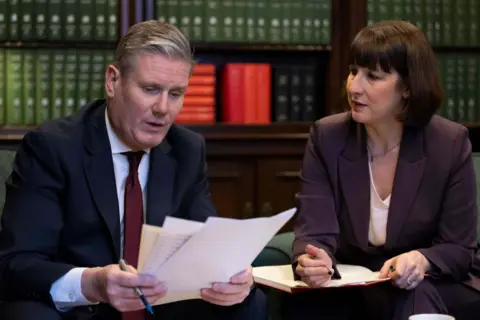 Getty Images
Getty ImagesAs she looks to balance the first Labour Budget in 14 years, Reeves admitted she speaks to several major political figures.
“I speak to Gordon regularly – I also speak to Tony Blair regularly,” she said.
She also maintains a “good relationship” with her predecessor Jeremy Hunt, regularly messaging the Conservative shadow chancellor.
“I may not be particularly impressed with the state of the public finances that he left me, but I do recognise that after Kwasi Kwarteng, he had a tough job to do as well,” she said.
The one person she wishes she could “pick up the phone to now” is Alistair Darling, the last Labour chancellor to deliver a Budget – who died last year aged 70.
Lord Darling served in cabinet for 13 years under both Blair and Brown, and was best known as the chancellor who steered the UK through the 2008 financial crisis.
“I hope that he would be proud of what I’m doing as the next Labour chancellor after him,” she said.
Reeves spoke about her pride at being the first female chancellor in the role’s 800-year history.
Becoming chancellor was “beyond what a girl like me, from the ordinary background that I came from, could have ever dreamed of,” Reeves said.
Now in her “dream job”, Reeves said, “one of the wonderful things in the first few months of doing this job is to meet female finance ministers from around the world” – such as US Secretary of the Treasury Janet Yellen and Chrystia Freeland, the Canadian finance minister.
“I take a lot of inspiration from those amazing women and so many others,” Reeves said.
Politics
Trump accuses UK’s Labour Party of ‘foreign interference’
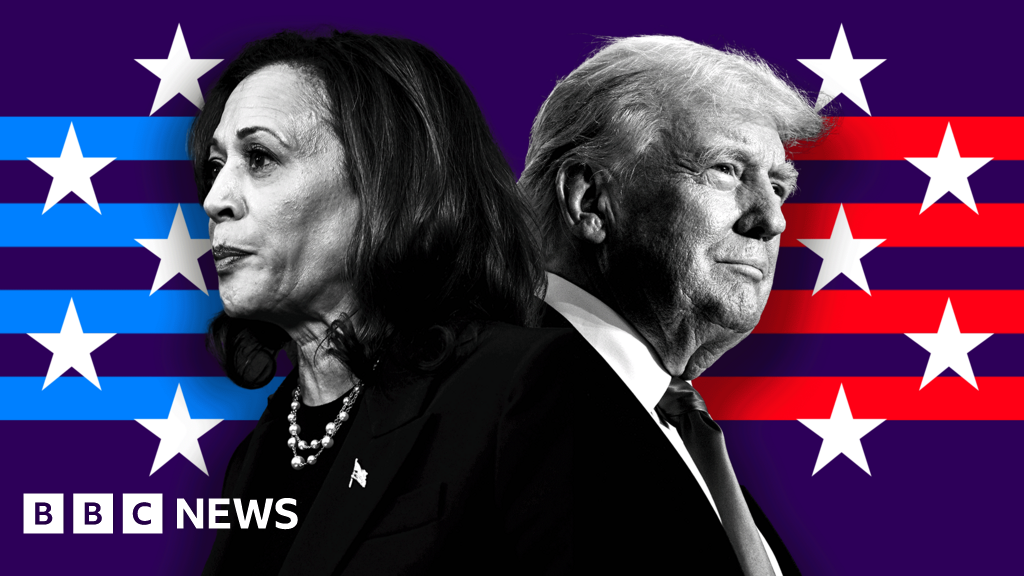
Donald Trump’s campaign has filed a Federal Election Commission (FEC) complaint against the UK’s Labour Party, accusing it of “blatant foreign interference” in the US election in aid of the Harris-Walz campaign.
The complaint cites media reports about contact between Labour and the Harris campaign, as well as apparent volunteering efforts, arguing that this amounts to illegal “contributions”.
The BBC understands that Labour activists campaigning in the US presidential election are doing so in a personal capacity.
The Labour Party has not issued an official response.
Specifically, the complaint cites newspaper reporting that Labour-linked individuals have travelled to the US to campaign for Harris.
That reporting, the complaint alleges, creates a “reasonable inference that the Labour Party has made, and the Harris campaign has accepted, illegal foreign national contributions.”
The letter refers to Washington Post reporting that communications were exchanged between the parties and that senior officials have met in private.
Additionally, the complaint cites a social media post on LinkedIn in which a Labour staff member said that “nearly 100” current and former party members will be headed to battleground states in the US.
The post, from Labour Party head of operations Sofia Patel, added that 10 “spots” are available and that “we will sort your housing”.
It appears to have since been deleted.
The complaint makes comparisons to an international programme in 2016 in which the Australian Labor Party, or ALP, sent delegates to help with Bernie Sanders’ campaign.
In that instance, however, the ALP paid for flights and daily stipends. The party and the campaign were each handed down civil penalties of $14,500.
Labour activists’ trips were not organised or funded by the party, it is understood from party officials.
Foreign nationals are permitted to serve as campaign volunteers as long as they are not compensated, according to FEC rules.
It is considered normal for party officials from the UK to be in contact with counterparts in the US.
It also has taken place previously between the UK’s Conservative Party and US Republicans.
The BBC has contacted the Harris-Walz campaign for comment.
Politics
Starmer warns Russia attacks in Ukraine risk global food security
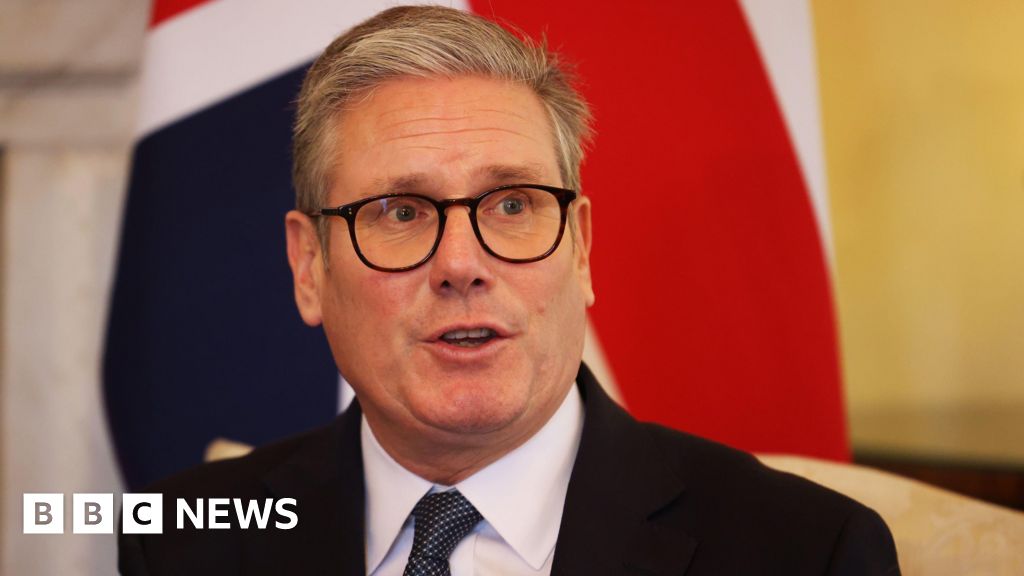
Prime Minister Sir Keir Starmer has warned that Russia is stepping up attacks on Ukrainian ports in the Black Sea – delaying the export of agricultural produce, including aid intended for Palestinians caught up in the conflict with Israel.
During several days of strikes in early October, Russian weapons hit at least four cargo ships, including one reportedly carrying 6,000 tonnes of corn.
Sir Keir said that Russia’s President Vladimir Putin was willing “to gamble on global food security in his attempts to force Ukraine into submission”.
The prime minister’s remarks came as he travels to the Pacific Island of Samoa for a meeting of Commonwealth heads of government.
During several days of strikes, Russian missile strikes on the Odesa region hit a Panamanian-registered ship and a Palau-flagged cargo ship were also attacked, killing one person on-board.
Several people in the southern city of Zaporizhzhia were injured as 29 homes were destroyed and pictures released by regional officials show a giant crater in the mud, with bricks and wood strewn all around.
A wave of strikes on Ukraine’s Black Sea ports coincided with a European tour by President Volodymyr Zelensky – who visited leaders in London, Paris, Rome and Berlin.
But Sir Keir pointed out the increasing number of Russian attacks coincided with harvest season.
Despite the war, Ukraine is still a significant supplier of agricultural goods.
But British intelligence suggests a growth in what officials call Russian “risk appetite” when attacking Ukrainian ports – with grain ships becoming what is described as “collateral damage” in Russia’s campaign.
Sir Keir said the “indiscriminate attacks” were “harming millions of vulnerable people across Africa, Asia and the Middle East”.
According to Ukrainian figures, more than 20 civilian ships have now been damaged in Russian attacks since the start of the war in 2022.
Grain silos and other port infrastructure have been badly damaged too.
However, Ukraine has succeeded in creating a maritime corridor to ensure the safety of grain exports, after Moscow pulled out of a Black Sea grain deal last year.
Some 962,000 tonnes of grain were exported in the first ten days of October, according to the agriculture ministry in Kyiv – double the volume shipped in the same period last year.
Speaking to journalists travelling with him to Samoa, Sir Keir said Russia’s recent recruitment of troops from North Korea was “an embarrassing and desperate act.
On Tuesday, the British government announced that it would give Ukraine an extra £2.26bn using the profits from Russian assets held in Europe.
The one-off payment is an addition to £3bn already pledged by the government to fund Ukraine’s war effort.
So far, the UK has given more than £12bn in military aid and has promised to match that level of support in the future.
Announcing the funding, Chancellor Rachel Reeves said it showed the UK’s support for Ukraine was “unwavering and will remain for as long as it takes”.
Politics
Kemi Badenoch hits back at Robert Jenrick’s ‘disrespectful’ jibe
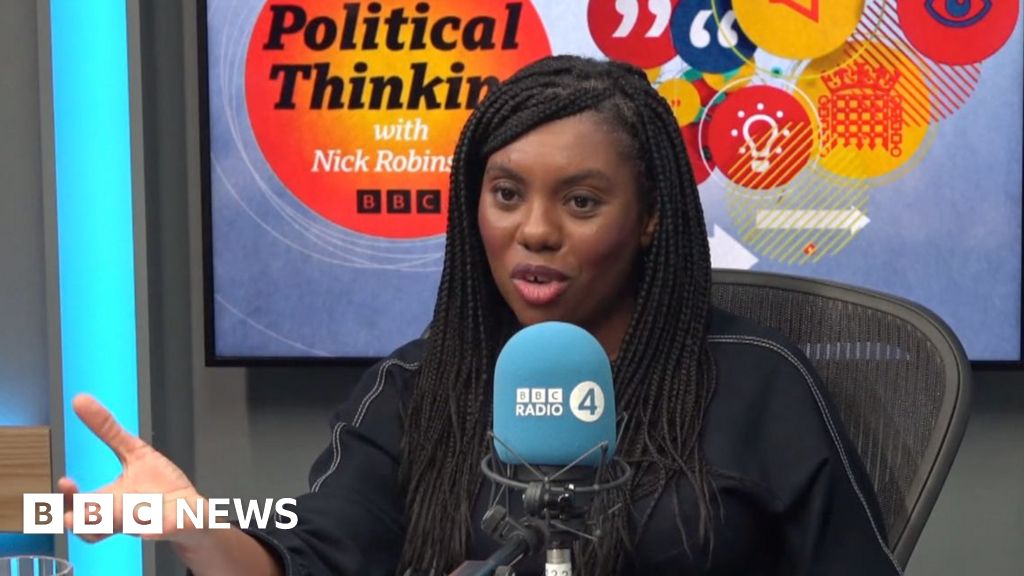
Kemi Badenoch has hit back at her Tory leadership rival Robert Jenrick’s claim that her decision not to set out detailed policies was “disrespectful” to the party’s membership.
Speaking to Political Thinking with Nick Robinson, Badenoch said she would not use that word about another candidate and that everyone had “their own campaign approach”.
“If this was a general election, yes, it would be wrong to be standing with no policies. This is not a general election,” she told Nick Robinson.
She added: “He [Jenrick] doesn’t know what he’s going to be standing on in four years’ time.”
Jenrick stood by his criticism in an interview with BBC Radio 5’s Matt Chorley.
“Kemi and I disagree on this point. I believe you have to start with principles and values, but I think that is not enough. You also have to have policies.”
He argued that the public were “deeply sceptical” of politicians and the best way to win them back was to set out policies and “lay out the trade-offs”.
“The age of policy-free politics is over,” he said, adding that it was “wrong” to ask party members to support you “on the basis of a plan for tomorrow”.
During the leadership campaign, Jenrick has said he wants to leave the European Convention on Human Rights, encourage housebuilding and oppose Labour’s plans on reaching net-zero carbon emissions.
Defending her approach, Badenoch said the party members know what her principles are. She said she would take time to design policies adding: “We have time, we don’t need to rush.”
She said she did not want to make promises “unless I know how I am going to deliver it”.
Earlier in the week, Jenrick told BBC Radio 4’s Westminster Hour: “I think it’s disrespectful to the members and the public to ask for their votes without saying where you stand on the big issues facing our country today.”
Conservative Party members are currently voting between the two candidates and a result is due on 2 November.
Unlike her rival, Badenoch has not done many media appearances, however in a wide-ranging interview she spoke to Nick Robinson about her thoughts on net-zero, immigration and Covid lockdowns.
On the environment, she said she was a “net-zero sceptic” but not “a climate change sceptic”.
She said she did not want to do something “because it looks good” and “before we figured out how to do it”.
She pointed to speeches she had made in Parliament on subject asking: “Lot’s of schoolchildren will be very happy, but where is the plan?”
She added: “Is net-zero a solution or is it a slogan… I am not sure we have properly thought that through.”
On immigration, she said “numbers matter but culture matters more”.
For several years, Conservative politicians have promised to get down the numbers coming into the country, but immigration has continued to rise, hitting record levels in 2022.
Badenoch said there should be a cap on numbers but it was also important to ensure those arriving “love British culture”.
Asked how the government should decide this, Badenoch said it was important to establish from which countries “successful migrants” were coming from.
“We should be getting to a point where we can say we’re happy to take more from countries A, B and C and for countries X, Y and Z, we’re going to have stricter rules.”
During the coronavirus pandemic, Badenoch was a Treasury minister. She said she would not apologise for spending “a lot” during Covid but added: “I think we just overran it to the point where it made inflation worse than it needed to be.”
She also said she thought the government “overdid it in terms of the length of lockdown”.
“There was a King Canute sort of situation. I thought that we were trying to do too much, that this was where government was overstretching itself and we weren’t trusting people enough.
“The biggest thing I hated was the fixed penalty notices.”
The notices were issued by the police to people who breached Covid rules, resulting in fines of between £200 and £10,000.
Both Boris Johnson and Rishi Sunak, the prime minister and chancellor during the pandemic, were issued with fines for breaching the regulations.
Badenoch said: “If Boris did not bring in those fixed penalty notices, he would not have had the Partygate scandal, certainly not to the extent that it was… he got caught in a trap that he had set for himself.”
She said Conservatives had “strayed away” from their principles of freedom.
Asked about her own leadership style, Badenoch said she aspired to be a “fun” leader and would try to bring some “humour” and “light-heartedness” to her approach.
“I think that we’ve been very gloomy. We’re not the gloomy party. We are actually quite an optimistic and fun party and I want to bring that out.”
Reflecting on her own background, she compared finding out that she was a British citizen to “finding out that you’d won the lottery”.
Badenoch explained that because she was born in Nigeria, a Commonwealth country, before a 1983 rule change, she qualified to be British – something she only found out when she was 14 years old.
She said there was a “very unpleasant sort of ethno-nationalist anti-Kemi wing” who called her an “anchor baby” – a term used in the United States to refer to people who ensure their children are born in the country in order to gain residency.
Badenoch was born in the UK because her mother had come to get medical care at a private hospital, but she said that is not why she qualifies as a British citizen.
Politics
‘Extreme wealth’ tax demanded by cross-party MPs

A dozen Labour MPs have joined a cross-party call for an “extreme wealth” tax in this month’s Budget.
The MPs have written to chancellor Rachel Reeves to demand a new 2% tax on assets worth more than £10m, which they claim could raise £24 billion per year.
The left wing Labour MPs and two Labour peers have joined forces with MPs suspended by Sir Keir Starmer, including former shadow chancellor John McDonnell, and former leader Jeremy Corybn, who was elected as an independent.
The call is also backed by the Greens, Plaid Cymru, the SDLP, Alliance and one Liberal Democrat MP.
The Labour Party has been asked for comment.
The chancellor is finalising details of her first Budget, to be announced on Wednesday 30 October. Government sources have told the BBC this will include tax rises and spending cuts to the value of £40bn.
In their letter to Reeves, the 30 MPs and peers say an extreme wealth tax is needed as billionaire wealth has increased by almost £150bn in only two years, between 2020 and 2022, but revenue from wealth taxes has remained stagnant at around 3.4%.
One of the MPs, Zarah Sultana, who represents Coventry South, flagged Oxfam research showing the richest 1% of Britons hold more wealth than 70% of the UK population.
“Austerity is, and always has been, a political choice,” she said. “It is grossly unfair that children and pensioners are being pushed into poverty while billionaire wealth continues to grow.
“We urgently need wealth taxes to rebalance power, fund essential public services and build a society where the needs of the many take precedence over the greed of a few.”
Reeves told the party’s autumn conference there would be “no return to austerity” under this government and promised a boost to government investment, designed to kickstart growth.
The MPs are also asking Reeves to equalise capital gains tax (CGT) and income tax rates in her budget.
They say this would “rectify unfairness in the tax system, where working people are subject to proportionately higher rates of tax”, and raise £16.7bn per year.
At the election, Labour promised not to increase taxes on “working people”, covering VAT (value added tax), income tax or National Insurance (NI), which limits the levers the chancellor can pull to bring cash in.
However, there has been speculation Reeves could increase CGT – charged on profits from the sale of assets like second homes – and also freeze the income tax threshold beyond 2028, potentially dragging more workers into the higher tax bands.
Sir Keir Starmer also did not rule out a National Insurance increase for employers in a BBC interview last week.
Reeves has already taken one unpopular decision, to remove winter fuel payments from 10m wealthier pensioners, which led to a rebellion by seven Labour MPs.
Sultana is one of five MPs who signed the wealth tax letter and who are currently suspended from the Labour Party for voting against the winter fuel payment cuts.
Some observers also wonder if the rebels, who were suspended for six months in July, may decide to team up with Corbyn’s independent group in January rather than re-join Labour.
The Labour rebels have teamed up with four of the smaller Westminster parties, including Wales’ Plaid Cymru and Northern Ireland’s SDLP and Alliance groups, plus all four Green Party MPs.
Green co-leader Carla Denyer called on Reeves to reconsider Labour’s decision to ditch its £28bn green investment pledge earlier this year, and invest more in public sevices.
“We cannot afford to have another government of spending cuts and economic hardship,” she said.
“Labour’s first Budget must take a resolute step to ensure that those with extreme, unprecedented levels of wealth help foot the bill.”
-

 Science & Environment1 month ago
Science & Environment1 month agoHyperelastic gel is one of the stretchiest materials known to science
-

 Technology4 weeks ago
Technology4 weeks agoIs sharing your smartphone PIN part of a healthy relationship?
-

 Science & Environment1 month ago
Science & Environment1 month ago‘Running of the bulls’ festival crowds move like charged particles
-

 Science & Environment1 month ago
Science & Environment1 month agoHow to unsnarl a tangle of threads, according to physics
-

 Science & Environment1 month ago
Science & Environment1 month agoMaxwell’s demon charges quantum batteries inside of a quantum computer
-

 Technology1 month ago
Technology1 month agoWould-be reality TV contestants ‘not looking real’
-

 Science & Environment4 weeks ago
Science & Environment4 weeks agoX-rays reveal half-billion-year-old insect ancestor
-

 Science & Environment1 month ago
Science & Environment1 month agoSunlight-trapping device can generate temperatures over 1000°C
-

 Science & Environment1 month ago
Science & Environment1 month agoLiquid crystals could improve quantum communication devices
-

 Science & Environment1 month ago
Science & Environment1 month agoQuantum ‘supersolid’ matter stirred using magnets
-

 Womens Workouts4 weeks ago
Womens Workouts4 weeks ago3 Day Full Body Women’s Dumbbell Only Workout
-

 Technology3 weeks ago
Technology3 weeks agoUkraine is using AI to manage the removal of Russian landmines
-

 TV3 weeks ago
TV3 weeks agoসারাদেশে দিনব্যাপী বৃষ্টির পূর্বাভাস; সমুদ্রবন্দরে ৩ নম্বর সংকেত | Weather Today | Jamuna TV
-

 Science & Environment1 month ago
Science & Environment1 month agoLaser helps turn an electron into a coil of mass and charge
-

 Science & Environment1 month ago
Science & Environment1 month agoWhy this is a golden age for life to thrive across the universe
-

 Science & Environment1 month ago
Science & Environment1 month agoA new kind of experiment at the Large Hadron Collider could unravel quantum reality
-

 Science & Environment1 month ago
Science & Environment1 month agoQuantum forces used to automatically assemble tiny device
-

 News3 weeks ago
News3 weeks agoMassive blasts in Beirut after renewed Israeli air strikes
-

 News2 weeks ago
News2 weeks agoNavigating the News Void: Opportunities for Revitalization
-

 Football3 weeks ago
Football3 weeks agoRangers & Celtic ready for first SWPL derby showdown
-

 Science & Environment1 month ago
Science & Environment1 month agoA slight curve helps rocks make the biggest splash
-

 Science & Environment1 month ago
Science & Environment1 month agoNerve fibres in the brain could generate quantum entanglement
-

 Science & Environment1 month ago
Science & Environment1 month agoHow to wrap your mind around the real multiverse
-

 News1 month ago
News1 month ago▶️ Hamas in the West Bank: Rising Support and Deadly Attacks You Might Not Know About
-
Business3 weeks ago
DoJ accuses Donald Trump of ‘private criminal effort’ to overturn 2020 election
-

 Business3 weeks ago
Business3 weeks agoWhen to tip and when not to tip
-

 MMA3 weeks ago
MMA3 weeks agoJulianna Peña trashes Raquel Pennington’s behavior as champ
-

 Science & Environment1 month ago
Science & Environment1 month agoITER: Is the world’s biggest fusion experiment dead after new delay to 2035?
-

 Science & Environment1 month ago
Science & Environment1 month agoNuclear fusion experiment overcomes two key operating hurdles
-

 Science & Environment1 month ago
Science & Environment1 month agoTime travel sci-fi novel is a rip-roaringly good thought experiment
-

 News1 month ago
News1 month ago▶️ Media Bias: How They Spin Attack on Hezbollah and Ignore the Reality
-

 Technology3 weeks ago
Technology3 weeks agoMicrophone made of atom-thick graphene could be used in smartphones
-

 Technology3 weeks ago
Technology3 weeks agoSamsung Passkeys will work with Samsung’s smart home devices
-

 News2 weeks ago
News2 weeks ago▶ Hamas Spent $1B on Tunnels Instead of Investing in a Future for Gaza’s People
-

 MMA2 weeks ago
MMA2 weeks ago‘Uncrowned queen’ Kayla Harrison tastes blood, wants UFC title run
-

 MMA3 weeks ago
MMA3 weeks agoPereira vs. Rountree prediction: Champ chases legend status
-

 Sport3 weeks ago
Sport3 weeks agoWales fall to second loss of WXV against Italy
-

 Science & Environment1 month ago
Science & Environment1 month agoPhysicists have worked out how to melt any material
-
News1 month ago
the pick of new debut fiction
-

 News1 month ago
News1 month agoOur millionaire neighbour blocks us from using public footpath & screams at us in street.. it’s like living in a WARZONE – WordupNews
-

 Technology4 weeks ago
Technology4 weeks agoWhy Machines Learn: A clever primer makes sense of what makes AI possible
-

 Technology1 month ago
Technology1 month agoMeta has a major opportunity to win the AI hardware race
-

 Technology3 weeks ago
Technology3 weeks agoMusk faces SEC questions over X takeover
-

 Sport3 weeks ago
Sport3 weeks agoBoxing: World champion Nick Ball set for Liverpool homecoming against Ronny Rios
-

 Sport3 weeks ago
Sport3 weeks agoWorld’s sexiest referee Claudia Romani shows off incredible figure in animal print bikini on South Beach
-

 Sport3 weeks ago
Sport3 weeks agoMan City ask for Premier League season to be DELAYED as Pep Guardiola escalates fixture pile-up row
-

 MMA3 weeks ago
MMA3 weeks agoDana White’s Contender Series 74 recap, analysis, winner grades
-

 News3 weeks ago
News3 weeks agoFamily plans to honor hurricane victim using logs from fallen tree that killed him
-

 Technology3 weeks ago
Technology3 weeks agoThe best budget robot vacuums for 2024
-

 Sport3 weeks ago
Sport3 weeks agoCoco Gauff stages superb comeback to reach China Open final
-

 Technology3 weeks ago
Technology3 weeks agoThis AI video generator can melt, crush, blow up, or turn anything into cake
-

 News3 weeks ago
News3 weeks agoGerman Car Company Declares Bankruptcy – 200 Employees Lose Their Jobs
-

 Sport3 weeks ago
Sport3 weeks agoSturm Graz: How Austrians ended Red Bull’s title dominance
-

 Money3 weeks ago
Money3 weeks agoWetherspoons issues update on closures – see the full list of five still at risk and 26 gone for good
-

 MMA3 weeks ago
MMA3 weeks agoPereira vs. Rountree preview show live stream
-

 News2 weeks ago
News2 weeks agoHeavy strikes shake Beirut as Israel expands Lebanon campaign
-

 TV2 weeks ago
TV2 weeks agoLove Island star sparks feud rumours as one Islander is missing from glam girls’ night
-

 Business3 weeks ago
Business3 weeks agoChancellor Rachel Reeves says she needs to raise £20bn. How might she do it?
-

 MMA3 weeks ago
MMA3 weeks agoAlex Pereira faces ‘trap game’ vs. Khalil Rountree
-

 News3 weeks ago
News3 weeks agoHeartbreaking end to search as body of influencer, 27, found after yacht party shipwreck on ‘Devil’s Throat’ coastline
-
Business3 weeks ago
Sterling slides after Bailey says BoE could be ‘a bit more aggressive’ on rates
-

 News3 weeks ago
News3 weeks ago‘Blacks for Trump’ and Pennsylvania progressives play for undecided voters
-

 Technology3 weeks ago
Technology3 weeks agoTexas is suing TikTok for allegedly violating its new child privacy law
-

 Science & Environment1 month ago
Science & Environment1 month agoPhysicists are grappling with their own reproducibility crisis
-
Business3 weeks ago
Bank of England warns of ‘future stress’ from hedge fund bets against US Treasuries
-

 Football3 weeks ago
Football3 weeks agoSimo Valakari: New St Johnstone boss says Scotland special in his heart
-

 TV3 weeks ago
TV3 weeks agoPhillip Schofield accidentally sets his camp on FIRE after using emergency radio to Channel 5 crew
-

 News3 weeks ago
News3 weeks agoWoman who died of cancer ‘was misdiagnosed on phone call with GP’
-

 MMA3 weeks ago
MMA3 weeks agoUFC 307 preview show: Will Alex Pereira’s wild ride continue, or does Khalil Rountree shock the world?
-

 Technology3 weeks ago
Technology3 weeks agoThe best shows on Max (formerly HBO Max) right now
-

 Technology3 weeks ago
Technology3 weeks agoJ.B. Hunt and UP.Labs launch venture lab to build logistics startups
-

 Sport3 weeks ago
Sport3 weeks agoChina Open: Carlos Alcaraz recovers to beat Jannik Sinner in dramatic final
-

 TV3 weeks ago
TV3 weeks agoMaayavi (මායාවී) | Episode 23 | 02nd October 2024 | Sirasa TV
-

 Technology3 weeks ago
Technology3 weeks agoPopular financial newsletter claims Roblox enables child sexual abuse
-

 News3 weeks ago
News3 weeks agoHull KR 10-8 Warrington Wolves – Robins reach first Super League Grand Final
-

 Technology3 weeks ago
Technology3 weeks agoOpenAI secured more billions, but there’s still capital left for other startups
-
Business3 weeks ago
Head of UK Competition Appeal Tribunal to step down after rebuke for serious misconduct
-
Business3 weeks ago
The search for Japan’s ‘lost’ art
-

 Sport3 weeks ago
Sport3 weeks agoAaron Ramsdale: Southampton goalkeeper left Arsenal for more game time
-

 News2 weeks ago
News2 weeks agoBalancing India and China Is the Challenge for Sri Lanka’s Dissanayake
-

 Entertainment3 weeks ago
Entertainment3 weeks ago“Golden owl” treasure hunt launched decades ago may finally have been solved
-

 Science & Environment1 month ago
Science & Environment1 month agoA tale of two mysteries: ghostly neutrinos and the proton decay puzzle
-
Business4 weeks ago
Eurosceptic Andrej Babiš eyes return to power in Czech Republic
-

 Sport1 month ago
Sport1 month agoJoshua vs Dubois: Chris Eubank Jr says ‘AJ’ could beat Tyson Fury and any other heavyweight in the world
-
News1 month ago
The Project Censored Newsletter – May 2024
-

 Technology4 weeks ago
Technology4 weeks agoArtificial flavours released by cooking aim to improve lab-grown meat
-

 Technology3 weeks ago
Technology3 weeks agoEpic Games CEO Tim Sweeney renews blast at ‘gatekeeper’ platform owners
-

 Science & Environment3 weeks ago
Science & Environment3 weeks agoMarkets watch for dangers of further escalation
-

 Technology3 weeks ago
Technology3 weeks agoApple iPhone 16 Plus vs Samsung Galaxy S24+
-

 Health & fitness3 weeks ago
Health & fitness3 weeks agoNHS surgeon who couldn’t find his scalpel cut patient’s chest open with the penknife he used to slice up his lunch
-

 Technology3 weeks ago
Technology3 weeks agoHow to disable Google Assistant on your Pixel Watch 3
-

 Money3 weeks ago
Money3 weeks agoPub selling Britain’s ‘CHEAPEST’ pints for just £2.60 – but you’ll have to follow super-strict rules to get in
-

 Technology3 weeks ago
Technology3 weeks agoA very underrated horror movie sequel is streaming on Max
-

 MMA3 weeks ago
MMA3 weeks agoKetlen Vieira vs. Kayla Harrison pick, start time, odds: UFC 307
-

 MMA3 weeks ago
MMA3 weeks agoHow to watch Salt Lake City title fights, lineup, odds, more
-

 News3 weeks ago
News3 weeks agoLiverpool secure win over Bologna on a night that shows this format might work
-

 Technology3 weeks ago
Technology3 weeks agoAmazon’s Ring just doubled the price of its alarm monitoring service for grandfathered customers
-

 Technology3 weeks ago
Technology3 weeks agoGmail gets redesigned summary cards with more data & features
-

 Technology3 weeks ago
Technology3 weeks agoMicrosoft just dropped Drasi, and it could change how we handle big data
-

 News3 weeks ago
News3 weeks agoHungry customer left gobsmacked as two blokes riding giant HORSES stroll into local chip shop


You must be logged in to post a comment Login